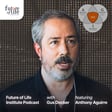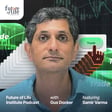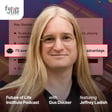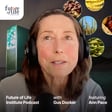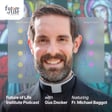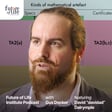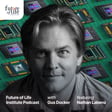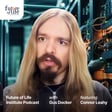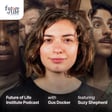Become a Creator today!Start creating today - Share your story with the world!
Start for free
00:00:00
00:00:01

Not Cool Ep 9: Andrew Revkin on climate communication, vulnerability, and information gaps
In her speech at Monday’s UN Climate Action Summit, Greta Thunberg told a roomful of global leaders, “The world is waking up.” Yet the science, as she noted, has been clear for decades. Why has this awakening taken so long, and what can we do now to help it along? On Episode 9 of Not Cool, Ariel is joined by Andy Revkin, acclaimed environmental journalist and founding director of the new Initiative on Communication and Sustainability at Columbia University’s Earth Institute. Andy discusses the information gaps that have left us vulnerable, the difficult conversations we need to be having, and the strategies we should be using to effectively communicate climate science. He also talks about inertia, resilience, and creating a culture that cares about the future.
Topics discussed include:
-Inertia in the climate system
-The expanding bullseye of vulnerability
-Managed retreat
-Information gaps
-Climate science literacy levels
-Renewable energy in conservative states
-Infrastructural inertia
-Climate science communication strategies
-Increasing resilience
-Balancing inconvenient realities with productive messaging
-Extreme events
Transcript
Positive Trends in Climate Action
00:00:00
Speaker
Behind the headlines, behind the red-blue, there's plenty of things to look at that are going the right direction. And no scientist and no long-time climate journalist like me would say it's enough, but it's real.
Introduction to Podcast & Andrew Revkin
00:00:13
Speaker
Hi, everyone, and welcome to the ninth episode of Not Cool, a climate podcast. As Climate Week continues at the United Nations and around the world, I'm thrilled to introduce my next guest, who was one of the earliest people to write about the threat of climate change. Andrew Revkin is one of America's most honored and experienced journalists focused on environmental and human sustainability. And he recently became the founding director of the new Initiative on Communication and Sustainability at Columbia University's Earth Institute.
00:00:43
Speaker
Prior to that, he spent a year as a strategic advisor at the National Geographic Society supporting worldwide environmental journalism. He was the senior reporter for Climate Change at the nonprofit investigative newsroom ProPublica, and he spent 14 years at the New York Times. He has written acclaimed books on humanity's weather and climate-learning journey, on global warming, on the changing Arctic, and on the assault on the Amazon rainforest. In spare moments, he is a performing songwriter.
00:01:11
Speaker
Andy, thank you so much for joining us. It's great to be with you. So you've been covering climate issues for quite a while.
Challenges in Decarbonizing Energy and Food Systems
00:01:19
Speaker
And I wanted to start with your take on how would you summarize what I think is actually a really big and difficult problem to summarize. Well, I guess, you know, it's been 30, gosh, I hate to say it, 33 years, I think now, 34.
00:01:35
Speaker
My first climate story was about nuclear winter. It was like the inverse of global warming. It was 1984, 1985, the idea that a nuclear war could throw so much crap into the atmosphere that it would chill the earth and we'd all suffer and ecosystems as well. 1988 was global warming and I've been at it in different ways ever since. If you include blog posts and stories, it's way over 3,000 plus three books that touch on this plus several book chapters on how to communicate about climate
00:02:03
Speaker
I think the summary I would give right now is that there's actually two enormous climate challenges and they operate on very different timescales and they give us a lot to work on that's actually addressable right now, even though it feels so global and amorphous and monumental. And the two challenges are we need to decarbonize our energy systems and our food systems. You know, we need to kind of stop what we've been doing unintentionally for a hundred years, which is building this pulse of influence on the climate system through emissions of greenhouse gases.
00:02:33
Speaker
But we need to recognize that that won't have any benefit for decades, none. The system is big and slow moving, and the climate system doesn't magically notice, even if Greta Thurbert and Al Gore became president and vice president of the world, starting tomorrow, the climate system might notice that, assuming they had a global impact on policy, sometime around 2060. Oh, wow.
00:02:53
Speaker
Yeah, no, inertia is a great 40 second video I did with a couple of MIT wonks a few years ago. I asked them, what's the thing about global warming that people, even people who are concerned about it don't understand? That's the biggest thing they don't understand. And John Riley at MIT said, inertia. And he basically repeated what I just said. We got to get busy decarbonizing because through our pulse of growth and development and rich and poor places and population shifts into zones of danger.
00:03:20
Speaker
We are building what some geographers have called an expanding bullseye of vulnerability and exposure. What that means is the thing that's changing way fastest that's driving risk related to climate is where we're living and how we're living. And that's something you could do something about right away, locally. You can look at your zoning. You can look at building codes in wildfire zones. You can actually make communities fundamentally safer and more resilient to climate stress right now. Those are two very different frontiers
00:03:49
Speaker
One has immediate impacts. It's still hard. Changing zoning and building codes takes time too, and sustained engagement in your community.
Immediate Local Actions for Vulnerability
00:03:56
Speaker
But it's something you can do right now. And then these more structural challenges. So you have an emissions free energy system, or even eventually something that sucks in more CO2, some kind of agricultural energy system or the like. That's a great, important, vital thing to be doing now to reduce long-term risk, but it doesn't have any real-time benefits. Just to make it clear, I mean, that means there's lots to do.
00:04:17
Speaker
That means it's not to be paralytic. It's not monumental. And it's something that everyone can do something about. At Columbia University, where I am now, we just had a big conference called Managed Retreat. What is that and how does it work and can we do it? You know, we know one of the most powerful things about climate change that's so powerfully established is that warmer climates on this planet come with much higher sea levels. Period. No debate. And that means we're facing sea level rise for centuries to come.
00:04:43
Speaker
The inertia factor I mentioned means there's nothing we do with the emissions of greenhouse gases that the oceans are going to notice for even more decades because the oceans have even more momentum and you don't just magically stop sea level from rising. That means the communities have to get real with their exposure that's been built over the last half century in so many places, in America, in China, in Vietnam, any place that's coastal
00:05:07
Speaker
Oh, Tacoban in the Philippines, that horrible typhoon that hit in the run-up to the Paris Agreement. Several thousand people were killed. But the thing that caused the high death toll, this is an area of the Pacific that gets hammered by typhoons, including extraordinary ones. That one was at the top end of the scale. But the thing that had changed in the last 40 years was Tacoban, the town. The population had grown four times over.
00:05:29
Speaker
mostly poor people moving into a city without governance adequate to provide housing and areas that are safe. And so you get crowded, informal development of the floodplain along the coast and along comes a typhoon and you have a terrible event. That's the vulnerability that we're building and rich people are doing the same thing. It's like the world's poorest and richest people in cities are building this expanding bullseye. I made it into a hashtag that the hashtag expanding bullseye people can explore.
00:05:55
Speaker
And it's over and over and over again. And it's even true in places where there's no evidence that climate change is playing a role in some
Importance of Managed Retreat and Mangroves
00:06:02
Speaker
hazard. The simplest place to look for that is Tornado Alley, where the worst tornadoes are the ones that do the most damage. There's literally no science saying that there's been a significant change in tornado behavior and the ones that kill people. F4, F5 tornadoes for decades. In fact, there's a slight downward trend.
00:06:18
Speaker
But what's happened in towns like more Oklahoma, which I wrote about a lot where they had a devastating high fatality tornado strike in 2013. I think it was the population had quadrupled in the last half century and people there don't have basements. There's no code saying you have to have a basement. There's no code saying you have to have a safe room. The vulnerability was being built at a high rate. We're talking about rapid rise in risks through building vulnerable structures and building a lot of them.
00:06:46
Speaker
That doesn't have anything to do with climate change. So what does that say? It says, you know, if you're not busy on the vulnerability reduction right now, then you're just setting yourself up for huge hits in the future. Does it seem possible to address the vulnerabilities in ways that don't then contribute more to the carbon in the atmosphere? Because it seems like if we have to build new structures in safer zones or if we have to move people that that's going to contribute. Or are there other solutions?
00:07:14
Speaker
The managed retreat I mentioned related to sea level rise is something that has to happen, period. Or it could be unmanaged retreat, that's fine too. That's what we call refugees or climate migrants. There's not a lot of refugees that you can link to climate change. There are people moving absolutely related to coastal vulnerability, flood zones, people move.
00:07:34
Speaker
The carbon impacts of that are pretty marginal because people are always moving. Cities are always changing. I don't think there's a way to think about that. That doesn't involve some emissions building houses somewhere else. But what can happen and actually is happening in many places is you can improve coastal resilience by planting mangroves, for example. Mangroves are like this win-win-win thing. They give you more surge vulnerability for sure along a coast. They definitely sequester carbon. In fact, I think there's some evidence they do a better job of it than terrestrial forests.
00:08:03
Speaker
and they're a biological resource. They're a haven for biodiversity. So actually there's another hashtag, mangroves matter. You'll see some really cool stuff about that too. My students at Pace University when I was there a number of years ago, we did a film on coral conservation in the Caribbean. And one of the lessons there is saving mangroves is also good for reefs because the fish that tend the coral reefs, I think it's something like half of the fish species on reefs start out in mangroves.
00:08:27
Speaker
So, you know, look for the win, win, win, win, win, win, wins. And that can make up for a little bit of a loss here and there by moving people in one direction or another. Okay. So you've just started at Columbia and they had an announcement about your new role.
Bridging Information Gaps at Columbia
00:08:42
Speaker
And one of the quotes was, we want to tackle specific climate and sustainability challenges where the impediment to progress is an information gap, a paralyzed conversation, or a missing connection between disciplines or sectors of society.
00:08:56
Speaker
I want to go into that quote a little bit and talk about what examples are of each of those things. What would you say are some examples of the information gap that we have to address? The lack of information, you could see that everywhere around the world. The worst gaps are, of course, in developing countries, poor places, poor communities here as well. You don't have the Internet. You don't have access to information. Those are fundamental gaps that give outsized advantage to people who are wealthier and more linked in.
00:09:25
Speaker
But some specifics are, here in Hudson River Valley, where I live, through a lot of hard work and innovative policy and some technological advances, you can have your community become a wholesale buyer of renewable energy. So you're not individual homeowners anymore, just paying a bill. This community choice aggregation option, CCA, is spreading pretty rapidly, but it could spread a lot quicker. People just don't know how to do it. They don't know, how do we make our town one of the ones that can be part of this process? If you're not even aware that it's an option,
00:09:53
Speaker
If you don't have a local newspaper anymore that is looking at things like energy choice, then you're not going to have that information. Those are the information gaps. In India, there's 120 million farming families in India. That's families, not individuals. One of the great achievements in North American farming history was extension service. Cornell and other land grant colleges would provide advice to farmers, but how do you do that in India? How do you plant a more resilient crop?
00:10:20
Speaker
There's an organization called Digital Green that has built a sort of a YouTube network where some facilitators go into villages. They talk with farmers who've taken on a better practice of using water more carefully or trying a new seed variety. And the farmers create these little videos in the dozens of local languages that you have around India. So that it's a farmer telling another farmer, you might want to try this. And that's kind of the problem of the solution
Effective Climate Communication Strategies
00:10:45
Speaker
all in one. The problem is that there's too many farmers. The solution is help create a network.
00:10:51
Speaker
Broken conversations I see all the time when I was doing my blog at Dot Earth, my New York Times blog, which I started in 2007 while I was still a reporter there.
00:11:00
Speaker
Half of the time I was mediating these brittle arguments between people who are hell no fracking and people like me who think you could have fracking happen in a responsible way, and natural gas is better than coal in many circumstances, and there's a lot of it, and we need energy in the Northeast to heat and cool our homes in. You could have legitimate debates about a lot of these things, but they end up getting stuck in this sort of yes-no positions.
00:11:23
Speaker
And what I started doing was digging in more to this other big body of science, not just climate science and energy, emissions science and the like, but social science. How do mediators do their job? What is a mediated conversation as opposed to a yelling debate on social media? There's a science to that. Some of it's peer reviewed science, actually. At Columbia, there's an initiative. There's a guy who I just met at Columbia University, Peter Coleman, who runs what he calls the Difficult Conversations Laboratory.
00:11:50
Speaker
And how many difficult conversations do you know that happen in this arena? GMOs versus organic. What's the role of nuclear power? No nukes. Yes nukes. What I'm looking for is some nukes. That's a hashtag too, some nukes. And then more fundamentally, the behavioral science that I started to learn way too late in my reporting journey, peer reviewed work also shows that science literacy is not an indicator of consensus.
00:12:16
Speaker
It's not like if you made a large population literate in climate science that doesn't automatically shift the argument toward solutions. In fact, there's demonstrable work by this group at Yale. They've invented a name for the field. It's Cultural Cognition. And there's a website, culturalcognition.net. They've shown that more literacy in science, you see it most frequently at the two ends of the dispute over climate change.
00:12:39
Speaker
So people who are most dismissive of the message about climate concern and people who are most worried have similar levels of climate science literacy. That's interesting. It's more than interesting. As a journalist, when I started diving into that work around 2006 through 2009, it was kind of an existential thing. You know, what do you live for as a journalist? You're a reporter writer because you want to sort of identify a problem and energize people towards solutions, whether it's gun violence or climate change.
00:13:06
Speaker
And it turns out that on issues, especially ones like climate change and gun violence that have become polarizing, that more information doesn't change anything. And you look at that and you go, oh crap. This issue with broken conversations to me is significantly about broken perceptions, meaning if you're trying to change the world and decarbonize the energy system in service of creating a safer climate,
00:13:32
Speaker
and you go to Woodward County, Oklahoma, and you come in saying, hey, everybody here, you have to agree there's a climate emergency or climate crisis so we can get busy solving global warming. You're actually making your job harder than you would be if you went in after getting more understanding of the people who live there. There was a great revelation of this in 2015 when John Sutter, a CNN reporter at the time, went to Woodward County, Oklahoma as part of a big two degrees project he was doing around the world.
00:14:00
Speaker
He went there because Yale University and partners had identified Woodward County, Oklahoma as ground zero for climate disbelief. So he went there and he started interviewing people. And there's a great summary of the interview, like a three minute video clip on YouTube. The Yale survey also showed that in Woodward County, Oklahoma, people actually are really supportive of renewable energy.
00:14:21
Speaker
some other part of their brain, some other part of their soul, some other part of their heart likes to be independent and have the capacity to generate their own energy rather than pay someone for it. So he went in there and this is this weird phenomenon. He interviews a guy who's got a pressed blue shirt and a nice conservative tie and he says, you know, God controls the environment. And for me as a progressive coastal person, you know, listening to that, my hair is starting to prickle. But then like a minute later, he's talking about energy. He says, you know, we have half of our roof covered with solar panels and we want to do the rest and get off the grid entirely.
00:14:52
Speaker
And John Sutter visited him at his house, and sure enough, he had more panels than he was going to do this. When I show this to audiences, I say, knowing what you know about this guy, would you run into that town going, climate emergency, climate emergency, expecting to build consensus? Or would you go into that town saying, hey, yeah, that's cool. You got solar panels. What's up? Maybe we could talk about ways that more people could get that capacity. The moral of the story is that telling your story is often a disservice to the bigger question.
00:15:21
Speaker
that listening is job one. And then you can engage ideally over time and build a constructive conversation about renewable energy standards or the like, and certainly about vulnerability in ways that don't polarize the issue by relying on these existing them and us templates that we have for the world. So how has your own work changed as you've realized this?
00:15:46
Speaker
Well, I think the blogging is what really got me moving in a more nuanced direction. Believe me, most commenters on the blog were not providing useful information. But absolutely every week, there was an insight that I gleaned by listening and tracking this conversation that I wouldn't have had otherwise, or an idea about a different way to ask a question. So it's that interactivity that's vital.
00:16:08
Speaker
Most journalism, like most science, has been an outward-focused process. Hey, look what I just did. Here's my story. I interviewed these guys. I went to the North Pole. I mean, that stuff is important. Going to the North Pole and writing about sea ice melting and going to Greenland and writing a book about the burning of the Amazon, those things were important. That always will be important. And investigative reporting is even more important and more endangered.
00:16:29
Speaker
But on these sticky problems, these wicked ones, like climate change, where it's energy policy, it's innovation policy, it's politics, it's legislation, it's law, it's science, climate science, it has a lot of uncertainty. We know the world's warming, we know we're the main driver, but we don't know how hot it's going to get by the century's end. That mix of characteristics make it implicitly not one story. It's many things. So breaking it into pieces, as you could do with a blog,
00:16:56
Speaker
or as I've seen other efforts are getting underway, to interrogate questions, to listen to audiences, to then shape stories that are open and engaging as opposed to sort of prescriptive. There feels like more possibilities.
Renewable Energy Progress in Conservative Areas
00:17:11
Speaker
And do you feel like you're starting to see people changing and adopting to climate, like in the Oklahoma example you gave, where maybe they're starting to do something that is beneficial, but maybe not for the reasons that scientists would like, but if they're doing it regardless? Yeah. Well, in 2017, for a while I was working for ProPublica, an investigative reporting independent newsroom.
00:17:35
Speaker
And that was right as Trump was getting into office, you know, so it was chaos veil and a lot of doom and gloom for many justifiable reasons. But I did a piece assessing if you actually look carefully at states around the country on energy policy, there are some very conservative states that have actually been leading the charge on renewables expansion, often not for reasons other than economic ones.
00:17:57
Speaker
Texas under Rick Perry, who's still very quietly the Secretary of Energy, had I think the biggest expansion of wind power in America. Even I'd have to see if it compares to Europe. Remember, Texas is pretty big. And none of that really had to do with politics. It was mostly about opportunity. And there were other states in the West. I think I remember Carbon County, Wyoming, which is named for the black stuff that they've been digging up.
00:18:20
Speaker
This was a couple of years ago. I'm not sure if this is still going forward. They had a plan to have what would be the largest single wind farm in the country with the electricity being targeted toward West Coast cities like Los Angeles. Also, a lot of the states that were fighting in court against Obama's Clean Power Plan, maybe it was 14 of the 17, were on a pace to hit the targets of the plan through like 2023. So not like the longer targets, but the short targets.
00:18:44
Speaker
Behind the headlines, behind the red-blue, there's plenty of things to look at that are going in the right direction. And no scientist and no longtime climate journalist like me would say it's enough, but it's real.
00:18:55
Speaker
This gets to one of the other limits on thinking about the communication strategies in the context of something like global warming. There are limits to what you can do with storytelling, given all the inertia that's in our system, too. It's not just climate inertia. There's infrastructural inertia. We have thousands of gas stations. We have dozens of charging stations. That takes time.
00:19:15
Speaker
We just chose a newish Prius rather than an EV because we do some long drives too. And I'm not ready to go to full EV. So here I am writing about this stuff for 30 years. I'm not quite there. So inertia is real, which means we have to divide this issue into the things we can do and the things we would like to do, but we know we really won't be able to do.
00:19:34
Speaker
getting some momentum in a certain direction, even if it's inadequate, feels to be vital. It's something that those campaigning for sort of a perfect approach can't really embrace because it undercuts the urgency rhetoric, but it's just there.
00:19:47
Speaker
The IPCC report that came out last year that gave us a vague 2030 as a deadline for making massive change. As someone who's trying to communicate about this, how do you try to get through to people? And how do you maybe turn back to the scientists sometimes and say this isn't possible? Or do you think that that's not an option? The way the IPCC is structured, it makes it hard for them to say something's impossible.
Limitations of the IPCC Structure
00:20:12
Speaker
They're asked questions by the 188 countries or whatever that chartered the IPCC to exist and pay its budget. So in the context of the Paris Agreement, they were asked to tell the world the difference between 1.5 degrees and 2 degrees. That was what that report was about. There's no scientist I know who says he or she knows in the world that we know how we would get anywhere near a 1.5 target. But they were asked a question. They had to answer the question. So it creates kind of an artificial answer.
00:20:41
Speaker
Scientists are not good at saying, we can't help you that. They want more science. They always want more science. A friend of mine, who's a climate scientist, was on a panel in the World Meteorological Organization, had some kind of recent conference with frontiers in climate. Someone asked the panel, each of them, to say, what would you do if you had a trillion dollars to spend on this problem?
00:20:59
Speaker
And she was kind of struck that the other people on the panel each said, more climate science, better computers. And she's much more focused on resilience on the ground and community impact. And she was kind of shocked. You know, scientists are great, but the majority of scientists involved with the IPCC are geophysical and ocean science. There never have been enough social scientists, anthropologists, sociologists. They're in there, but they're a tiny minority and they always feel kind of overwhelmed.
00:21:27
Speaker
And that's kind of unfortunate because you end up with this, when the message gets out of the IPCC process into the world, it's sort of interpreted in a very caricatured way. 12 years, the clock is ticking and everything falls apart. And there's no one, if you go on Twitter and look for 12 years, there are many, many climate scientists who've gotten onto Twitter and stress that that's not what this means. This is not like a cliff thing. This is a slope into a tougher future. Every year, we're not cutting emissions. We're adding to that long-term outcome that's not going to be easy to recover from.
00:21:56
Speaker
But it doesn't make for a good headline. 12 years to doom, there's a headline. Yes, that gets a lot more attention. So I do want to keep talking about what's been changing because it feels like, to me, it seems like in the last couple of years, I am seeing a lot more awareness globally about the climate issue. And I was curious what you've seen change and what you think is some of the biggest factors driving more people to be concerned.
00:22:23
Speaker
Well, there's been significant surveys in the US and I think a few global ones that show for sure experience with recent events, not just the headlines, but people's direct experience with the drought or an extraordinary rainfall, like nothing they can remember or the wildfires in the West for sure. Those have been linked statistically to the level of concern people register in surveys. It's definitely changed. When I look at the background things,
00:22:47
Speaker
many things have changed. Just thinking about my own community here, this little village in Hudson Valley, 10 or 15 years ago, we did not have the option to be a community that can buy all renewable energy. And we can. And it's happening as of September or something or other. And you can opt out of it if you're a curmudgeon, but it's happening. The community voted in on that. The last mayor of my village is a Republican. And under his tenure, we became a quote unquote climate smart community. And we're trying to make that actualized.
00:23:17
Speaker
years ago was unthinkable. All around the world, the price of renewables has gone way down, and the applicability and utility is going up. It's not nearly enough. The fossil energy needs are such that it's projected pretty confidently that even 2030 will still be 80% fossil. Again, inertia in energy systems is another reality, so it's never enough. And for every one of these arenas where I could cite progress like that, I can also point to Brazil,
00:23:44
Speaker
where I was reporting in the Amazon in 1989 after the murder of Chico Mendez. I wrote my book about his life and death. And from that point forward, violence against forest defenders, deforestation rates dropped quite remarkably from like 2004 until the last couple of years. And now, of course, it's an upsurge. It was happening some extent before Bolsonaro was elected, but now he's kind of just through his rhetoric. He's liberated illegal loggers and miners to dive into the Amazon in ways that are very troubling. None of this is like
00:24:14
Speaker
happy times, but there are abundant examples of progress out there. That's when I get energized about, well, what's the role of communication innovation in spreading that progress?
Empowering Communities for Climate Solutions
00:24:25
Speaker
So on that note, one of the big questions that I have, because I feel like I'm in this category, is how do you communicate to people who are totally on board with the fact that we need to be doing something, what they actually need to do?
00:24:37
Speaker
You talked about how people aren't necessarily aware of the option with the community energy sources. How do we address the fact that there's those of us who want to do something and just don't know what to do? I actually just put in a proposal to South by Southwest on how to help spread and expand local successes on energy and climate resilience. I think it's an open frontier. Again, the answer really is not communicating to... It's absolutely communicating with
00:25:04
Speaker
or enabling communication, empowering people to connect with each other, like those farmers in India. A perfect example is right here in New York City, in the school system. Another great discovery at Columbia University for me is the education. The Teachers College folks have a sustainability program. And there's a guy there named Oren Pilimoni-Levy, who's been working pro bono for the New York City Schools Sustainability Unit. And they have a million students
00:25:30
Speaker
65,000 teachers, 1,400 schools, something like that. And under Mayor Bloomberg, 2013 or so, every school had to identify someone to be their sustainability coordinator. That's all great, but what do you do with that? And these are volunteers, and everyone in the school is busy.
00:25:47
Speaker
And so he's been doing a statistical analysis of these volunteer sustainability coordinators and some of them are really engaged and they're actually doing more than they should. They're fantastic at working with teachers or they are teachers and they're building this into the curriculum and they do something that I think is a fantastic first step, which is a boiler room tour. When students go down into the bowels of the school and learn how it works as a system. In New York City, it's mostly oil. In New York City, schools right through the 90s were still burning coal in their basements.
00:26:17
Speaker
So students learn about energy history, they learn about what you can and can't do with renewables, they start to integrate that into learning. He said there's a number of schools where the kids are measuring their waste that they generate and creating tables and using math and statistics to understand trends and recycling. So the communication challenge is how do you spread that stuff? And he said on Instagram, there are teachers, they have thousands of followers and they have their syllabus out on Instagram for other teachers to adopt.
00:26:44
Speaker
And as I was talking with Oren over and over, the thing that was coming up is how do you help facilitate teachers trading ideas with each other? But that's not me telling a story, you know, it's what can we do to enable communities of practice in that case, or communities like mine or anyone's to do an energy audit in a community. That's hard actually. So how do you do that? That's what excites me every day. That means there are frontiers, there are best practices and people creating surprising progress, but then how do you spread that? That's the new communication frontier really to me.
00:27:13
Speaker
There's still plenty to do with storytelling, data visualizations, animation, integrating into the arts. Those are all fantastic important fronts too, but it's more the enabling story sharing and idea shaping. So getting people to communicate with each other as well, as opposed to just hearing what you or I have to say.
00:27:32
Speaker
And actually that's job at Columbia. We're just today, we're going to be creating the architecture to build a network within Columbia, which has dozens of departments, probably hundreds of centers, meaning in a little funded things. There's public health researchers and there's two or three energy innovation teams. The Earth Institute has the Lamont Orduity Earth Observatory up Hudson that does this great work on paleoclimatology past climates. And the same campus has IRI, which is an institute that studies risks from climate like El Nino.
00:28:01
Speaker
They don't talk a lot. I'd like them to talk more. I'm not discrediting any of them. They're doing great work, and it's really hard to sort of poke your head up and say, hey, maybe I should share my work or ask some questions of others and that kind of thing. So we're going to build an internal network for making things bigger and better and more shareable, and then that will spill out hopefully into the community and between scientists and reporters, between scientists and teachers for sure.
00:28:23
Speaker
Do you think we're asking enough of people or do you think we're maybe not being realistic enough with the public about what changes need to be made? It's a great question. The challenge, I guess, is that brutal realism on climate means making sure people understand that the worst impacts are still in the future. That's not convenient if you're trying to generate urgent action. Sea level rise between now and 2100 is still deeply uncertain.
00:28:50
Speaker
30, 40 years of global warming science, including science on ice sheets, is not really advanced much beyond where it was 30 or 40 years ago in terms of how do you integrate what we know about ice behavior with what sea level rise is likely to be in the year 2100 or 2050. 2050 is worse. Brutal clarity on climate science leads to inconvenient realities in terms of messaging. And I'm all about being brutally honest.
00:29:14
Speaker
And then examining, making it sure people understand that the decarbonization part of the climate tasks that we have, cutting emissions, is a legacy that we are leaving for the world of the future, including for species too, biodiversity, acidification of oceans, disruption of ecosystems. We're leaving a legacy for the planet system, not just for humans of the year 2100.
00:29:36
Speaker
And as I said earlier in our chat, the stuff we're seeing out the window right now, like the deaths in Tacoban in the Philippines from that surge from the Typhoon Ayan, or the fires in the West.
00:29:47
Speaker
nearly all of the losses, there's absolutely a component of global climate change, meaning CO2-driven warming in the behavior of fires in the West. The dry, wet cycles, you get a lot of growth of stuff, then it dries out, and then you have heat and more drought, and some idiot drops a cigarette, or PG&E doesn't trim the branches around its wires, and you have horrible conflagration. But the thing you can miss, and it's totally scientific, is all that building, all that development that happened in the woods there in the last 50 years,
00:30:17
Speaker
If the same fires had occurred 50 years earlier, there wouldn't have been the tragedy of paradise. That town is pretty newborn. It grew up in an area of known vulnerability to fire. There were a couple of really close calls. They didn't add escape roads. And you look at satellite images and you see these horrible situations where the houses burned down because wind-borne embers got to a little housing development, but the trees around the development didn't burn.
00:30:42
Speaker
And he realized it was, as one scientist at Arizona State called it, an urban fire in the middle of a forest. And the science says that's something that could have been mitigated absolutely by building codes and, you know, more careful attention to the details of how houses are built so that embers don't get in through little gaps and 85 people died. And the death count, the losses, the financial losses, the primary driver of the losses is still where and how we're building, not a change in the climate system yet.
00:31:09
Speaker
That was a problem with Houston as well, wasn't it? Oh, yeah. Puerto Rico, even Hurricane Maria. I wrote a story in 2007 about past patterns of hurricanes in Puerto Rico, revealed by digging into the mud flats behind the beaches of the Sota salt marshes. And there's a record of past strong storms and it shows that that area of the Caribbean has actually had pulses of really hardcore hurricane activity, even when the climate was cooler.
00:31:33
Speaker
So we look at that and some people are eager to make the horrible, devastating pain and suffering and loss there about global warming. It's not scientific. It's about vulnerability. It's about dysfunction. It's about lack of investment. It's about a federal government that doesn't care about Puerto Rico. Those are really important stories. But even in terms of hurricane patterns, we can't say with any confidence that in a warming Caribbean, you'll end up with more storms like Maria.
00:31:58
Speaker
They're there. They're in the system. The system, it's like a gun that's got enough bullets in the chambers that there'll be more hurricanes regardless. And so again, the losses, the story, it's about resilience. So in a way, to me, that shows how if you look at the science with an objective lens, it leads you to plenty of actionable things to do right now. But to me, it also points to the importance of not always making the conversation about this big amorphous thing called global warming.
00:32:23
Speaker
but also about addressing our own vulnerabilities. Vulnerability and energy, for sure. Absolutely. If you can move to renewables, great. Whatever you do there has to be robust in the face of hurricanes, period. Those are things that we should be actively working on. Is there anything else that you think is really important that you wanted to share that we didn't get into?
00:32:43
Speaker
Well, more than 30 years in in global warming, my first big story in global warming was in 1988. And it says a lot of what I've been saying ever since. So it's easy to feel burned out and bummed out by how big this is. And it's monumental. And the Anthropocene, this human age, is one that's coming with great consequences for changing the world in ways that will last easily hundreds of thousands of years.
Building a Culture for Future Generations
00:33:04
Speaker
The changes we're making in biology will have an imprint on the tree of life going forward for the same length of time, even longer.
00:33:10
Speaker
So the challenge of our time is how do we take ownership of that, knowing that we can't change some of the stuff, a lot of it. We can't because of momentum. But we can change a lot too. And we can build a culture, hopefully, that cares about the future. The idea would be to build a culture that has a timescale of concern and a geographic scale of concern. That means we have some empathy and sympathy and interest in the fate of a grandchild of someone living in Bangladesh today, even though we live in North America today.
00:33:39
Speaker
that there's a continuity here, there's a continuum, there's a zone of responsibility that means we all owe each other something. That's one thing. And then to me, the thing I would work on hardest and feel the best about is leaving behind capacities and toolkits that allow for the magic of connectivity to persist and spread so that we can look at these tough problems at the community scale and to a certain extent of the global scale.
00:34:04
Speaker
and have the connectivity, so the right minds, the right parts come together in ways that can make a difference in a particular question here and there. The biggest thing that gives me the enthusiasm to wake up every morning kind of energized, even though I go to bed bummed out, is when you have a fractal, complicated, humongous, super wicked problem like this, it means there's some facet of it that every person on the planet can do something about, artist, communicator, teacher, engineer, entrepreneur. There's something in it for everybody.
00:34:32
Speaker
That's one of the interesting things about climate change for me is we deal with so many different really big problems like nuclear weapons, artificial intelligence, all these things that most people really can't do anything about. You can vote, you can try to be active, but climate change is one where you really can, every little bit really does help. Bingo. When we think of social media these days, it's really easy to get pumped out as well. The communication environment is a jungle. There are trolls and hackers and presidents who have co-opted these amazing tools that can provide global connectivity
00:35:01
Speaker
I would love to think of people finding a way to experiment, at least with it, to find a way to look at Twitter one more time if you've bailed out. Just dip back in and then look for a hashtag that relates to something you care about and see if you can enter into that conversation just a little bit. I think if we approach social media sort of like
00:35:19
Speaker
I should approach thalasthenics or something, or meditation. It's like a practice, something you put into your day. That can really make a big difference. It can make an individual's impact have that little bit of extra potential to connect with someone in Italy or Iran. And actually just two days ago, an Iranian journalist, science writer, out of the blue, contacted me. I still haven't found out quite how. And we had an hour-long talk about how to collaborate on spreading some journalism training in Iran that might help with this.
00:35:48
Speaker
Oh, that's wonderful. Yeah. I like that. Again, it comes back to the communication between people. And we do have some really powerful platforms to help enable that. Absolutely. Well, thank you so much. I really enjoyed this. Me too. We can do it again sometime.
00:36:05
Speaker
On the next episode of Not Cool, a climate podcast, we'll be joined by Stephanie Herring, a climate scientist at NOAA who studies extreme weather events. We are finding more events that we simply cannot replicate in a world where human caused climate change hasn't happened. We knew that someday we'd cross this threshold. I personally thought that was going to happen much later. I was a little surprised at how soon it showed up in the data.
00:36:32
Speaker
My interview with Stephanie will go live on October 1st. As always, if you enjoyed this show, please take a moment to like it, share it, and maybe even leave a good review. And please join the conversation on Twitter using hashtag not cool and hashtag change for climate.









